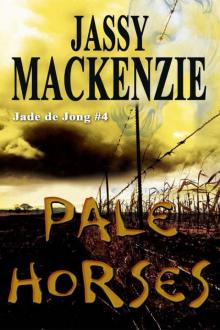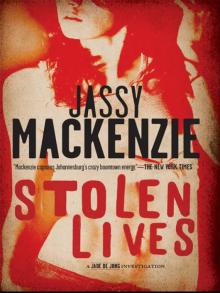- Home
- Jassy Mackenzie
The Fallen Page 2
The Fallen Read online
Page 2
‘I didn’t finish it,’ she said. ‘I was there with a client who pulled out before the halfway mark. I was disappointed, but there was nothing I could do. It felt like a failure, too, even though it wasn’t my fault.’
Amanda gave a small nod and a shadow crossed her face.
‘Failure’s never easy to cope with,’ she said in a soft voice. ‘Especially when it’s not your fault.’
Her hand strayed to the small gold airplane pendant that she wore on a chain around her neck, and she slid it from side to side; an instinctive gesture that Jade had seen her make before, but thought Amanda herself was unaware of.
Taking comfort from the familiar action, perhaps.
Jade wondered what failure Amanda had experienced. Whatever it was, she clearly didn’t want to talk about it, and Jade wasn’t going to ask.
Changing the topic, she said, ‘That’s a pretty piece of jewellery.’
The dark-haired woman smiled.
‘My mother gave it to me when I started work at Heathrow.’
‘Flight attendant?’
Now Amanda’s smile widened. ‘No. Actually, I’m an air-traffic controller. I started out in England and then travelled around the world. That’s what I’m qualified to do; what I’ve always done. The scuba diving is just a hobby, really.’
Jade nodded, hoping her surprise didn’t show on her face. She’d never have imagined that the woman who had been so patiently teaching her to dive had held down one of the toughest and most responsible jobs in the world—co-ordinating the approach and departure of airplanes at what must be one of the world’s busiest commercial airports.
‘I see,’ she said. ‘Sorry.’
‘For what?’
‘Underestimating your abilities.’
‘You wouldn’t be the first one to do that. People see a dive instructor in her thirties, working in a little resort like this, and they assume she’s a drifter who never had any ambitions in life. At least you asked.’
Jade smiled.
‘That was my old life,’ Amanda continued. ‘Up until last year. I’ve been here almost six months now.’
‘Are you enjoying the change? It must be far less stressful.’
Jade had thought Amanda would agree, but instead she looked away.
‘Not really,’ she said.
Her words struck a chord with Jade. Made her reflect on her own situation. She was qualified as a bodyguard and had years of experience as a private investigator, working on her own and with big firms. But that might well have to change now.
She knew David didn’t approve of the work she did, because of the danger to which it exposed her. Not to mention the fact that in solving her cases she often chose to go beyond the law, or that some of the cases she handled were not legal at all.
Could she do what Amanda had done? Turn her back on her previous life and start afresh doing something else? And if so, what on earth would that new career involve? Would it be too late to finish the law degree she’d started long ago, before she had decided that her heart and her talent lay elsewhere?
One thing was for sure—becoming a scuba-diving instructor was definitely out of the question.
‘Shall we go under again? Aim for sixteen minutes this time?’ Amanda asked.
Jade dug her fingernails into the palms of her hands. One more dive. Another visit to the depths. The time stretched ahead of her, endless as a prison sentence, but she had to do it. The only thing she feared more than being under the water was giving up on trying.
‘OK. Let’s give it a go,’ she said.
3
The tin roof of the small meeting room amplified the heat a thousand times over. Bradley felt as if the corrugated metal was a magnifying glass, and he was the bug trapped underneath.
Sweat poured through the close-cropped hair at the back of his neck. It had long since drenched the armpits of his starched shirt, sluicing straight through the thick layer of antiperspirant he’d applied earlier that morning and causing him to stink like a pig.
His chest was also slick with sweat, but his tie was still dry. More importantly, so was the large and heavy cellphone that hung on a lanyard around his neck.
He was sitting on a plastic chair in a room with a closed door, a sealed window and a broken air-con unit that seemed to be actively taunting him.
Bradley had been used to air conditioning that worked. Plush meeting rooms with upholstered furniture, audio-visual equipment, jugs of iced water and bowls of perfectly ripe fruit. There, in those cool and airy spaces, he would impress the chairman of the board, the directors, the committee members. Always aiming to be under budget and ahead of schedule, whatever marine engineering project he tackled.
He’d never found himself dripping with sweat in those meetings. And he’d never had to go into them with the kind of bad news that he had to break now. He’d always reported on successes, not problems, not that he could remember, anyway. And particularly not problems that he himself had caused.
Across the table from him, Chetty, his current employer, lifted a stubby-fingered hand and scratched his balding head. Chetty wasn’t wearing a suit and tie, only a shabby golf shirt and a pair of chinos. And Chetty wasn’t sweating. Chetty was the kind of man who looked like he never broke a sweat. ‘So everything’s on track?’ he asked.
‘Ahead of schedule,’ Bradley said, starting with the positives. ‘All ready for action. You have a full team of workers now, ready for the final assignment.’
‘The work on the Karachi’s hull?’
‘Finished. And all the—er—special equipment you requested is in place.’
‘Any other issues?’
And there it was. Should he tell them or not? Bradley had no idea. His employers had said they needed to know about everything and anything that could possibly affect the outcome of this project. But this problem was personal, something that involved him. Did they really need to be informed?
Not if he could handle it, and make it go away. But what would happen if he couldn’t?
Chetty rocked back on his chair, a small smile on his pudgy face, looking for all the world like he was out relaxing on the deck of an international cruise liner and not stuck inside this suffocating little room.
‘Are we good?’
In that instant, Bradley decided he wouldn’t mention what was worrying him. He would sort it out by himself, in his spare time. It would be better if he kept his employers in the dark, he thought.
‘There is something, isn’t there?’ a voice said softly.
The words came from the third person in the room. A muscular giant of a man whose tight black T-shirt and jeans blended so well with his body that Bradley could hardly tell where skin ended and fabric began.
Bradley knew him only as Zulu. A code name or a surname—he didn’t know which, and he wasn’t going to ask. Even on this sweltering day, the man still gave him the shivers.
Zulu looked directly at him, as if he could see right into Bradley’s guilt-stained core.
‘What aren’t you telling us?’ he asked.
Chetty rocked forward on his chair. Its legs hit the floor with a thud.
‘Well? Is there a problem?’ His voice sounded suddenly sharp.
Bradley’s stomach churned with sick dread. He snatched a breath and started speaking, aware that his voice was now fast and panicky.
‘OK, I had a text message yesterday.’ He glanced down at his knees. ‘Not on this work phone. On one of my old numbers. It’s nothing to do with the job—almost certainly—but it seems that an old friend, well actually an old acquaintance, is attempting to blackmail me.’
‘What?’
Chetty shouted so loudly that he earned a glance from Zulu.
The black man raised an eyebrow. ‘Given your history, I am assuming this acquaintance is a she, not a he.’
Bradley nodded miserably. ‘It is a woman.’
‘And how do you know her?’
‘We were—er—involved for a short time,
a while ago.’
‘What does she want?’ Chetty leaned forward, his elbows on the table.
‘Well, money, of course.…’
‘What she wants is irrelevant,’ Zulu said. ‘What is important is this: why does she want it? What does this woman know?’
‘She doesn’t know about this operation. It’s personal,’ Bradley muttered. ‘Personal stuff. An amateur attempt at getting money out of me.’ He felt his face burning with shame.
‘Shit,’ Chetty said.
Zulu nodded, his face giving nothing away.
‘How did you know who it is?’ he asked. ‘Blackmail, by its very nature, is supposed to be anonymous, is it not?’
‘I picked up on some clues. It wasn’t difficult. In one of the texts, she told me where she was working.’
Chetty let out an explosive guffaw.
‘She gave away her location?’
‘Yes.’
‘You’re right. That is amateur.’
‘Amateur, perhaps, but I would still prefer that the amount not be paid and that the problem … is simply disposed of.’ Zulu cast a meaningful glance at Bradley, who felt a fresh wave of sweat flood down his back—this one prompted by fear.
His left leg had started to tremble, too. What was wrong with him?
Bradley tried hard to suppress the thought that in his past life he had never received assignments like the one he was working on now. Be tough, he told himself. You can deal with this. You know you can.
He clamped his knees together to stop his leg from shaking, and folded his arms.
‘Her details, please, just for the record,’ Zulu added.
Stammering slightly, Bradley told him the woman’s name, and the name of the beachside resort where she lived and worked. He knew that Zulu would memorise the address, rather than write it down. Nothing had ever been written down during their meetings, and his employers had told him that the phone he’d been instructed to wear around his neck at all times had an in-built anti-bugging mechanism that would beep if any recording devices were in the area.
Or on Bradley himself.
‘I think it’s best you stay out of it. You shouldn’t be seen in the area at all,’ Chetty advised.
‘I understand.’
‘Get Kobus to do it.’
‘I will.’
‘That’s all for now, then. You can go.’
Bradley got up so fast he almost knocked over his chair. He wrenched open the door and stumbled outside.
Chetty groaned as the door banged shut behind the departing project manager.
‘What a bloody screw-up,’ he said, although whether he was commenting on the situation or on Bradley himself was unclear. ‘How’d you know he was hiding something?’
Zulu smiled lazily. ‘The room is hot, but not that hot. He was sweating like a guilty man. Like somebody with a secret.’
‘You think we’ve been wrong to trust him?’
Zulu considered the words in silence for a while.
‘No,’ he said. ‘He is trustworthy.’
‘I worry he’s planning on selling us out to the cops.’
‘He won’t sell us out to the cops.’
‘How do you know?’
‘Because he is greedy and because he is scared. He is waiting for his money, and is frightened about going back to prison.’
Chetty didn’t look convinced.
‘Getting him paroled early might not have been enough incentive. Or is there something you’re not telling me? Have you got something else on him?’
Zulu didn’t reply, but his smile widened.
4
Jade had never been more relieved to feel solid ground under her feet. Calling out a hasty thanks to Amanda, she jogged back along the jetty, her footsteps sounding hollow on the boards. She crossed the wide strip of blindingly white sand and headed up the grassy hillside towards the row of wooden chalets beyond. Her chalet was on the far left, next door to the more modest staff quarters.
After a quick shower, she was ready to go.
David’s flight would be landing in three hours’ time, and the airport was only two and a half hours away. But Jade wasn’t going straight to the airport. First she was going to drive to the nearby town of Richards Bay and visit the local graveyard.
Jade had never known her mother—Elise de Jong had died when her only child was less than a year old—and she had only recently learned the truth about who, or rather what, she had really been. Now she wanted to see her grave; to stand at the final resting place of the woman who had passed on her deadly talents, as well as her slim build, brown hair and green eyes.
What was she going to say to her at her graveside?
Jade didn’t know. Perhaps it would be something simple like, ‘Why couldn’t you have been good at needlework instead?’
She started her car and turned on the air conditioning full-blast, an exercise she had discovered reduced the little rented Fiat’s engine power by about fifty per cent and doubled its fuel consumption. Then she set off up the concrete driveway flanked by palm trees on one side and bushy forest on the other, and through the low wooden gate that stood wide open between battered-looking white pillars and a rickety wooden fence. The gate and the fence were the only barriers separating the private resort from the outside world—a fact Jade found rather troubling. She hadn’t realised how accustomed she had become to the high walls and electrified wires that protected almost every property in Johannesburg.
Like so many other places in South Africa, Richards Bay had grown dramatically in the past thirty years. The expansion had been accelerated by the end of apartheid in 1994. The once-sleepy little seaside village was now a major hub of industrial activity. It was the place where many of the motor vehicles produced in South Africa were assembled, and it was also home to two aluminium processing plants, as well as a number of mining operations that took place near, but not inside, the iSimangaliso Wetland Park.
As Jade turned off the highway and onto the main road that led into the centre of the sprawling town, she tried to imagine what might have been there when her father had been posted here, long ago, as a police detective. Her father had never talked much about his life before Jade—he hadn’t been a great one for talking in general, and had only occasionally opened up to his only child.
The main road had been in existence back then. She knew that from an old map of the area she’d found in the box of her father’s possessions that David had given to her when she’d returned to South Africa more than ten years after his death. So Commissioner De Jong, or whatever rank he’d held in those days, must have driven along it many times, just as she was doing now.
The buildings on her right wouldn’t have been there, though. They were far too new—a walled Mediterranean-style residential complex built on what must have been vacant land. But the houses on the left looked older. Perhaps he would have seen them too, when their roofs were in better repair, their paintwork fresher and brighter.
And there, ahead of her, was the town cemetery.
She saw rows and rows of gravestones behind the high wrought-iron fence, their shadows sharp in the afternoon sun. Some graves untended, some well cared for, a few with colourful bunches of flowers at the foot of their headstones.
‘How did my mother die?’ she’d asked her father once.
‘There was a very wet summer in Richards Bay, where we lived at the time,’ her father had told her, his voice sad. ‘There was an outbreak of malaria in the town.’
‘Did that kill her?’
‘Malaria on its own doesn’t often kill. But the complications often do. Cerebral malaria is nearly always fatal.’ He’d turned away from Jade in a manner that made it clear that any further questions would be unwelcome.
The cerebral malaria that her mother had contracted had indeed been fatal. It had swiftly led to the kidney failure that had been the eventual cause of her death.
Jade drove through the cemetery’s main gateway and stopped under a tree in the
otherwise deserted parking lot. Not far from her, an elderly black man wearing shabby trousers and a ragged cast-off T-shirt bearing the faded legend ‘Richards Mining Triathlon Team’ was sitting on a rock under another, smaller tree. Next to him, in a blue plastic bucket, were a few bunches of lilies. When he saw her, he heaved himself to his feet, lifted the bucket, and made his way slowly towards her.
‘How much are the flowers?’ Jade asked. She realised she was feeling nervous, butterflies fluttering in her stomach the same way they might do if she’d been on her way to meet a stranger that she had heard about for a long time, but never known.
‘Fifty rands a bunch,’ the old man replied. His ‘s’ sounded thick and sibilant. He smiled, showing a gummy gap where his front teeth should have been.
‘I’ll take one, thanks.’
Clutching the flowers, she made her way towards the cemetery gate, then stopped. She realised she had no idea where her mother’s grave was and she hadn’t expected the cemetery to be so large. In fact, it was probably a few acres in size. She turned around.
‘Do you know where I can find the caretaker?’ she called.
The old man hunched his shoulders in an expressive shrug.
‘He’s not here.’
‘Oh.’ Jade paused. ‘Is there a list, or a plan of the graves inside; some way of finding out where somebody is buried? This is the first time I’ve been here.’
The man didn’t answer immediately. He made his way back to his rock and carefully put down his bucket. Then he straightened up again. From twenty paces, Jade heard his back pop.
He started shuffling towards the gate.

 Pale Horses
Pale Horses Bad Seeds
Bad Seeds Random Violence
Random Violence Folly
Folly Stolen Lives
Stolen Lives The Fallen
The Fallen Soaring
Soaring Drowning
Drowning